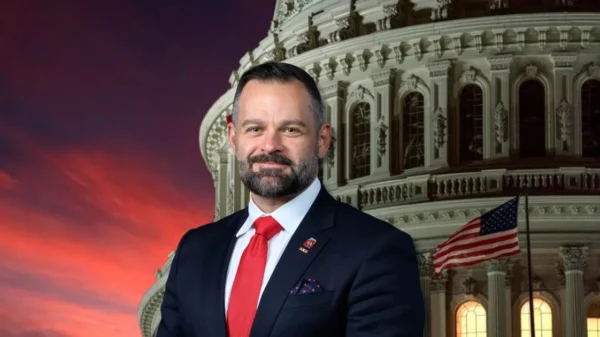Members of the Florida delegation from both sides of the aisle are urging the passage of the “Water Resources Development Act” (WRDA) as it heads to the House floor.
This week, U.S. Rep. Peter DeFazio, D-Oreg., steered the proposal through the U.S. House Transportation and Infrastructure Committee that he chairs.
“This legislation provides authority for the U.S. Army Corps of Engineers (Corps) to carry out water resources development projects and studies, as well as policy direction to the Corps for implementation of its civil works missions,” DeFazio’s office noted.
“I am pleased that today the Transportation and Infrastructure Committee passed a bipartisan WRDA bill by voice vote, which is now headed the House floor for a vote,” said DeFazio after the committee vote on Wednesday.
Over in the Florida delegation, U.S. Rep. Debbie Mucarsel-Powell, D-Fla., the vice chairwoman of the U.S. House Water Resources and Environment Subcommittee and a member of the Transportation and Infrastructure Committee, explained why she backed the WRDA, pointing to her efforts to remove the “new start” requirement delaying creating the Everglades Agricultural Area Reservoir – a crucial part of Everglades Restoration.
“I am extremely proud to pass the Water Resources Development Act of 2020, which delivers on my constituents’ top environmental priorities: expediting Everglades Restoration, increasing transparency about water flow, and improving the ecosystem in Florida Bay, which supports South Florida’s economy and jobs in eco-tourism,” said Mucarsel-Powell. “With today’s bill, we make it very clear to the Corps that they must begin construction of the reservoir at its earliest opportunity, and they are not to wait for a ‘new start’ designation because my constituents need solutions now – not 10 years from now. I look forward to continuing to work with the community on this critical environmental and economic issue.”
During the committee hearing, Mucarsel-Powell weighed in on why she was backing the proposal.
“I would like to express my support for this bill. It includes one of my top priorities, which will speed up construction of the Everglades Agricultural Area Reservoir – a crucial part of Everglades Restoration,” she said. “We have been trying to restore the Everglades for two decades now. Since 2000, the intent of this committee has always been to move forward with Everglades Restoration as a singular program. It was then when Congress passed the Comprehensive Everglades Restoration Project, or CERP.
“Later in 2016, Congress authorized the Central Everglades Planning Project, or CEPP, which is a part of CERP. The projects that make up CEPP, including the EAA Reservoir, are the lynchpin of Everglades Restoration. This Committee never intended for each small project that comprises Everglades Restoration to be treated as a brand new project that needs a new approval – or a quote ‘new start’ – for construction to begin. But unfortunately, that’s where we have found ourselves,” she continued. “In 2018, Congress modified the authorization for the reservoir to make it deeper and therefore able to store water. Unfortunately, however, we learned earlier this year that the Army Corps of Engineers determined that because Congress modified the plans for the Reservoir, it was no longer part considered to be part of CEPP and would therefore be considered a brand new project that need to receive a ‘new start’ designation.
“Given how rare ‘new start’ designations are, this wrongful interpretation threatened to delay the start of the reservoir for potentially years. This was frankly an absurd and harmful interpretation that I was determined to address in this bill, and I am grateful to the committee leadership for working with me on it,” Mucarsel-Powell continued. “With today’s bill, we make it very clear to the Corps that they must begin construction of the reservoir at its earliest opportunity, and they are not to wait for a ‘new start’ designation.
“I’d also like to thank the chairman for including my provision to require the Corps to publish monthly reports which show where water is flowing in South Florida. This data already exists in a raw form, but these reports will…synthesize data and will present the information in a manner that is easily understood by the general public, not just trained hydrologists and engineers. These will inform debates about Everglades Restoration moving forward,” she concluded. “We have been waiting long enough for Everglades Restoration. My constituents need solutions now – not 10 years from now. With today’s bill, we will help expedite the construction of the reservoir, bring more water south through the Everglades, and improve the ecosystem in Florida Bay.”
Over on the other side of the aisle, U.S. Rep. Dan Webster, R-Fla., also backed the proposal.
“Water is critical for life and solid infrastructure is critical to Florida’s economy which is dependent on moving goods and people efficiently and effectively,” said Webster. “Throughout my public service, I have advocated for policies that support local projects and find solutions that preserve and protect Florida’s precious natural resources, while balancing the needs of our growing economy.”
“I applaud Chairman DeFazio for returning to committee tradition and developing this bill with bipartisan input and support. This legislation authorizes funding for critical ports, inland waterways, locks, dams, flood protection, ecosystem restoration, and other water resources infrastructure important to Florida and our nation,” Webster continued. “I am particularly glad, this bill was passed today without language that would put Florida communities, the Everglades and our vital agriculture industry at great risk of water shortages during our dry seasons. Thanks to hard work with committee leadership and stakeholders across Florida, we have an agreement that helps tackle the algae blooms while also ensuring water access for everyone and the Everglades are protected.”
U.S. Rep. Brian Mast, R-Fla., also backed the WRDA, insisting it will help reduce toxic discharges into Lake Okeechobee and will speed up building the EAA Southern Storage Reservoir.
“For decades, our community has been on the receiving end of toxic discharges over 60 times more toxic than the EPA considers safe for human contact, putting our public health at risk. These discharges – which the Army Corps of Engineers has acknowledged to be toxic – absolutely must come to an end,” Mast said. “Demanding that the Army Corps must seek to reduce discharges to our estuaries is a huge victory, and now our fight continues to build on this momentum, continue the fight for zero discharges and send the water south!”
The bill now heads to the House floor.
Reach Kevin Derby at kevin.derby@floridadaily.com.



















